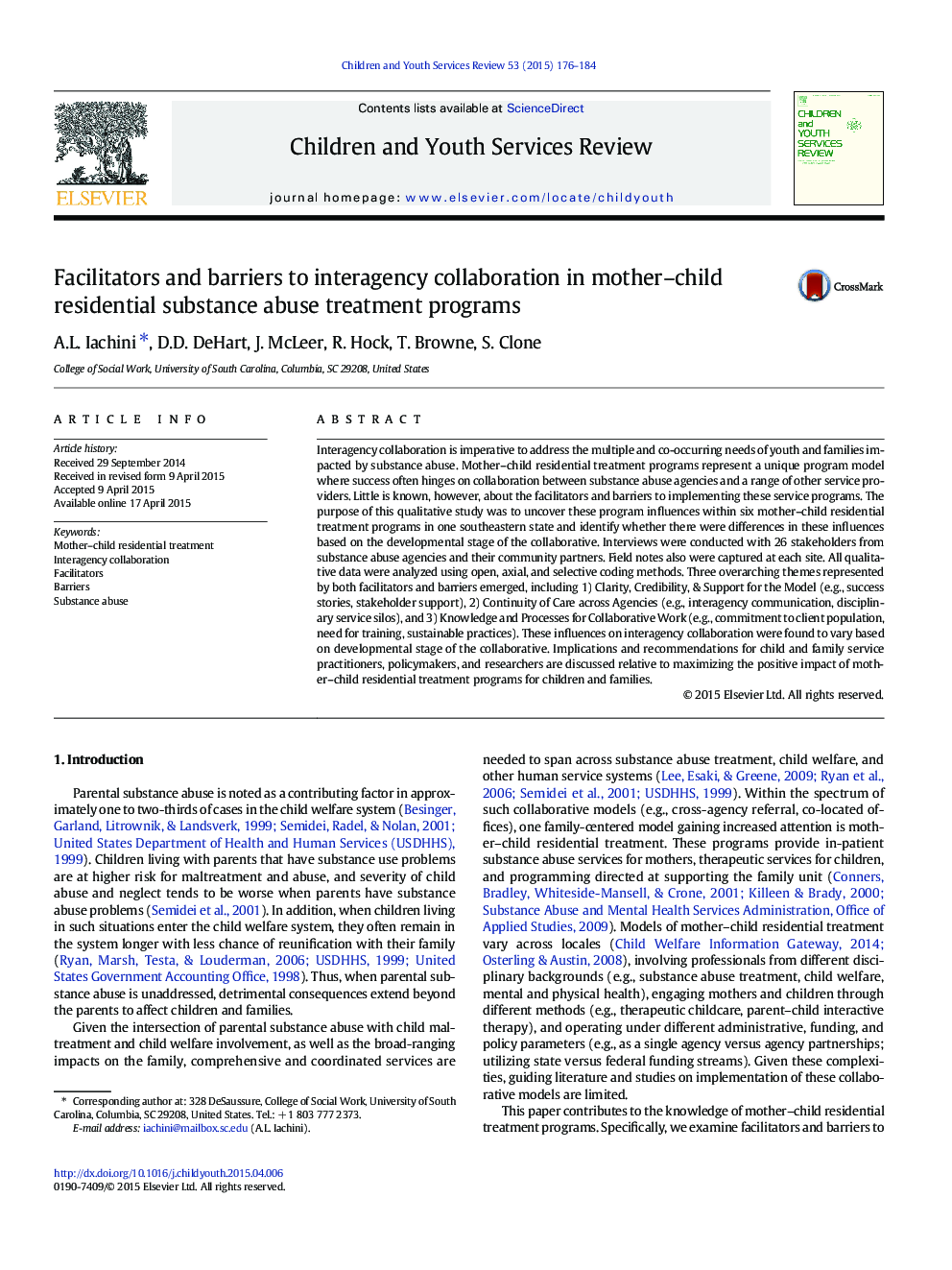| کد مقاله | کد نشریه | سال انتشار | مقاله انگلیسی | نسخه تمام متن |
|---|---|---|---|---|
| 6834056 | 617783 | 2015 | 9 صفحه PDF | دانلود رایگان |
عنوان انگلیسی مقاله ISI
Facilitators and barriers to interagency collaboration in mother-child residential substance abuse treatment programs
ترجمه فارسی عنوان
تسهیلکنندگان و موانع همکاری میان سازمان ها در برنامه های درمان اعتیاد به مواد مخدر مادر و کودک
دانلود مقاله + سفارش ترجمه
دانلود مقاله ISI انگلیسی
رایگان برای ایرانیان
کلمات کلیدی
مادر درمان کودک مسکن همکاری متقابل، تسهیل کنندگان، موانع، سوء مصرف مواد،
ترجمه چکیده
همکاری بین سازمان ها ضروری است تا به نیازهای متعدد و همیشگی جوانان و خانواده هایی که تحت تاثیر سوء مصرف مواد قرار گرفته اند، مورد توجه قرار گیرند. برنامه های درمان مسکن مادر و کودک نشان دهنده یک مدل برنامه منحصر به فرد است که در آن موفقیت اغلب به همکاری بین سازمان های سوء مصرف مواد و تعدادی از دیگر ارائه دهندگان خدمات بستگی دارد. با این حال، در مورد تسهیل کننده ها و موانع اجرای این برنامه های خدمات شناخته شده اند. هدف این مطالعه کیفی این بود که این برنامه ها را در طی شش برنامه درمان مسالمت آمیز مادران در یک کشور جنوب شرقی تشخیص دهد و اینکه آیا بر اساس این مرحله از همکاری، اختلاف در این تأثیرات وجود دارد. مصاحبه ها با 26 ذینفع از سازمان های مواد مخدر و همکاران محلی آنها انجام شد. یادداشت های درست نیز در هر سایت ضبط شد. تمام داده های کیفی با استفاده از روش های کدگذاری باز، محوری و انتخابی مورد تجزیه و تحلیل قرار گرفت. 2) تداوم مراقبت در سراسر سازمان ها (به عنوان مثال، ارتباطات بین اداری، سیلوهای خدمات انضباطی)؛ 2) تداوم مراقبت در سراسر سازمان ها و 3) دانش و فرآیندهای کار همکاری (مثلا تعهد به جمعیت مشتری، نیاز به آموزش، شیوه های پایدار). این تأثیرات بر همکاری بین سازمان ها بر اساس مرحله توسعه همکاری متفاوت بود. پیامدها و توصیه هایی برای متخصصان خدمات درمانی و خانوادگی، سیاستگذاران و محققان در رابطه با به حداکثر رساندن تاثیر مثبت برنامه های مراقبت از زندگی مادر و کودک برای کودکان و خانواده ها مورد بحث قرار گرفته است.
موضوعات مرتبط
علوم پزشکی و سلامت
پزشکی و دندانپزشکی
پریناتولوژی (پزشکی مادر و جنین)، طب اطفال و بهداشت کودک
چکیده انگلیسی
Interagency collaboration is imperative to address the multiple and co-occurring needs of youth and families impacted by substance abuse. Mother-child residential treatment programs represent a unique program model where success often hinges on collaboration between substance abuse agencies and a range of other service providers. Little is known, however, about the facilitators and barriers to implementing these service programs. The purpose of this qualitative study was to uncover these program influences within six mother-child residential treatment programs in one southeastern state and identify whether there were differences in these influences based on the developmental stage of the collaborative. Interviews were conducted with 26 stakeholders from substance abuse agencies and their community partners. Field notes also were captured at each site. All qualitative data were analyzed using open, axial, and selective coding methods. Three overarching themes represented by both facilitators and barriers emerged, including 1) Clarity, Credibility, & Support for the Model (e.g., success stories, stakeholder support), 2) Continuity of Care across Agencies (e.g., interagency communication, disciplinary service silos), and 3) Knowledge and Processes for Collaborative Work (e.g., commitment to client population, need for training, sustainable practices). These influences on interagency collaboration were found to vary based on developmental stage of the collaborative. Implications and recommendations for child and family service practitioners, policymakers, and researchers are discussed relative to maximizing the positive impact of mother-child residential treatment programs for children and families.
ناشر
Database: Elsevier - ScienceDirect (ساینس دایرکت)
Journal: Children and Youth Services Review - Volume 53, June 2015, Pages 176-184
Journal: Children and Youth Services Review - Volume 53, June 2015, Pages 176-184
نویسندگان
A.L. Iachini, D.D. DeHart, J. McLeer, R. Hock, T. Browne, S. Clone,
